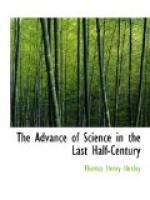[Sidenote: Morphology.]
In the department of anatomy and development, a host of accurate and patient inquirers, aided by novel methods of preparation, which enable the anatomist to exhaust the details of visible structure and to reproduce them with geometrical precision, have investigated every important group of living animals and plants, no less than the fossil relics of former faunae and florae. An enormous addition has thus been made to our knowledge, especially of the lower forms of life, and it may be said that morphology, however inexhaustible in detail, is complete in its broad features. Classification, which is merely a convenient summary expression of morphological facts, has undergone a corresponding improvement. The breaks which formerly separated our groups from one another, as animals from plants, vertebrates from invertebrates, cryptogams from phanerogams, have either been filled up, or shown to have no theoretical significance. The question of the position of man, as an animal, has given rise to much disputation, with the result of proving that there is no anatomical or developmental character by which he is more widely distinguished from the group of animals most nearly allied to him, than they are from one another. In fact, in this particular, the classification of Linnaeus has been proved to be more in accordance with the facts than those of most of his successors.
[Sidenote: Anthropology.]
The study of man, as a genus and species of the animal world, conducted with reference to no other considerations than those which would be admitted by the investigator of any other form of animal life, has given rise to a special branch of biology, known, as Anthropology, which has grown with great rapidity. Numerous societies devoted to this portion of science have sprung up, and the energy of its devotees has produced a copious literature. The physical characters of the various races of men have been studied with a minuteness and accuracy heretofore unknown; and demonstrative evidence of the existence of human contemporaries of the extinct animals of the latest geological epoch has been obtained, physical science has thus been brought into the closest relation with history and with archaeology; and the striking investigations which, during our time, have put beyond doubt the vast antiquity of Babylonian and Egyptian civilisation, are in perfect harmony with the conclusions of anthropology as to the antiquity of the human species.




